Filter News
Area of Research
News Topics
- (-) Cybersecurity (14)
- (-) Quantum Computing (17)
- 3-D Printing/Advanced Manufacturing (34)
- Advanced Reactors (8)
- Artificial Intelligence (43)
- Big Data (21)
- Bioenergy (48)
- Biology (56)
- Biomedical (28)
- Biotechnology (10)
- Buildings (17)
- Chemical Sciences (21)
- Clean Water (14)
- Climate Change (46)
- Composites (5)
- Computer Science (80)
- Coronavirus (17)
- Critical Materials (1)
- Decarbonization (43)
- Emergency (2)
- Energy Storage (28)
- Environment (100)
- Exascale Computing (24)
- Fossil Energy (4)
- Frontier (23)
- Fusion (28)
- Grid (23)
- High-Performance Computing (42)
- Hydropower (5)
- Isotopes (25)
- ITER (2)
- Machine Learning (21)
- Materials (39)
- Materials Science (40)
- Mathematics (5)
- Mercury (7)
- Microelectronics (2)
- Microscopy (19)
- Molten Salt (1)
- Nanotechnology (16)
- National Security (33)
- Net Zero (8)
- Neutron Science (45)
- Nuclear Energy (52)
- Partnerships (13)
- Physics (26)
- Polymers (7)
- Quantum Science (27)
- Renewable Energy (1)
- Security (10)
- Simulation (29)
- Software (1)
- Space Exploration (11)
- Summit (30)
- Sustainable Energy (42)
- Transformational Challenge Reactor (3)
- Transportation (27)
Media Contacts

A team of researchers including a member of the Quantum Science Center at ORNL has published a review paper on the state of the field of Majorana research. The paper primarily describes four major platforms that are capable of hosting these particles, as well as the progress made over the past decade in this area.
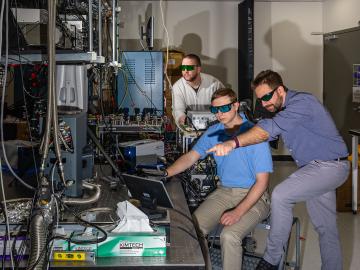
ORNL scientists are working on a project to engineer and develop a cryogenic ion trap apparatus to simulate quantum spin liquids, a key research area in materials science and neutron scattering studies.

Researchers simulated a key quantum state at one of the largest scales reported, with support from the Quantum Computing User Program, or QCUP, at ORNL.
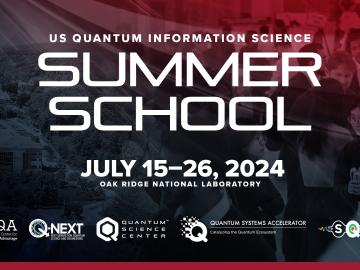
From July 15 to 26, 2024, the Department of Energy’s Oak Ridge National Laboratory will host the second U.S. Quantum Information Science, or QIS, Summer School.
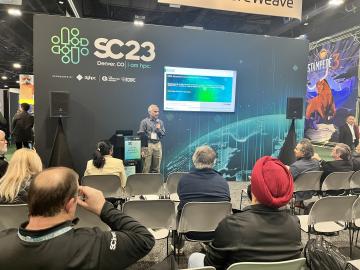
ORNL’s successes in QIS and its forward-looking strategy were recently recognized in the form of three funding awards that will help ensure the laboratory remains a leader in advancing quantum computers and networks.
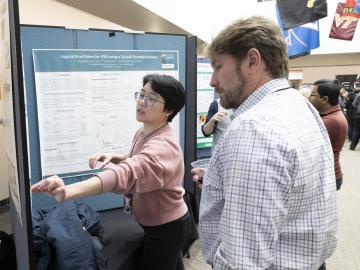
On Nov. 1, about 250 employees at Oak Ridge National Laboratory gathered in person and online for Quantum on the Quad, an event designed to collect input for a quantum roadmap currently in development. This document will guide the laboratory's efforts in quantum science and technology, including strategies for expanding its expertise to all facets of the field.
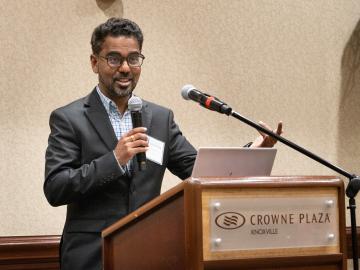
The Department of Energy’s Oak Ridge National Laboratory hosted its Smoky Mountains Computational Science and Engineering Conference for the first time in person since the COVID pandemic broke in 2020. The conference, which celebrated its 20th consecutive year, took place at the Crowne Plaza Hotel in downtown Knoxville, Tenn., in late August.
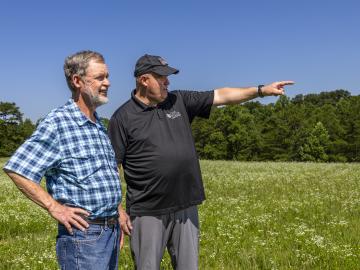
Carl Dukes’ career as an adept communicator got off to a slow start: He was about 5 years old when he spoke for the first time. “I’ve been making up for lost time ever since,” joked Dukes, a technical professional at the Department of Energy’s Oak Ridge National Laboratory.
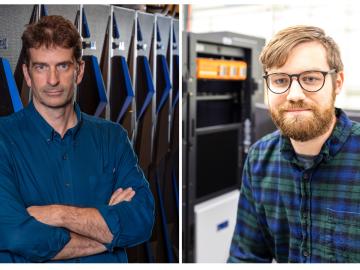
Tom Karnowski and Jordan Johnson of ORNL have been named chair and vice chair, respectively, of the East Tennessee section of the Institute of Electrical and Electronics Engineers, or IEEE.
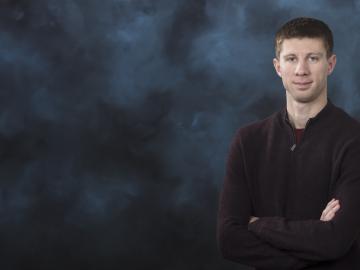
Mike Huettel is a cyber technical professional. He also recently completed the 6-month Cyber Warfare Technician course for the United States Army, where he learned technical and tactical proficiency leadership in operations throughout the cyber domain.




